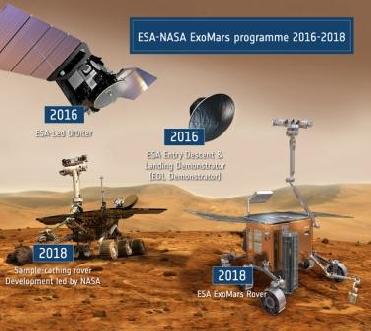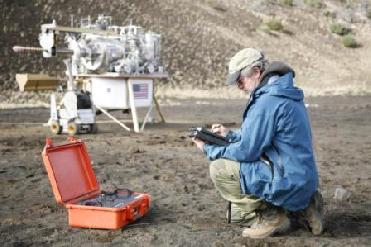
The ExoMars Programme. ESA photo
LONDON (PTI): British scientists have announced the start of work on a new mission to Mars in 2018 that will explore the possibility of life on the planet.
Scientists at the University of Leicester Friday announced the start of work, in collaboration with industry, on advanced instruments for ExoMars (Exobiology on Mars).
ExoMars is the first mission to attempt to obtain samples at a depth of 1-2 metre below the surface of Mars where they are protected from radiation and oxidants thought to exist on the surface, and both of which would destroy/ heavily degrade complex organic compounds.
The scientists from the university are involved in five instruments on board the ExoMars mission, including building the hardware for three of the instruments on board the craft.
The ExoMars mission is one of the key missions under the remit of the newly formed UK Space Agency.
ExoMars is a European-led robotic mission to Mars, developed by the European Space Agency (ESA) and NASA.
It is part of ESA's Aurora programme for robotic exploration of the Solar System and its aim is to further characterise the chemical, geological and possible biological environment on Mars in preparation for robotic missions and then human exploration.
Data from the mission will also provide invaluable input for broader studies of exobiology - the search for life on other planets.
The mission to Mars also has major Earth-bound applications with spin-offs in collaboration with industry bringing environmental benefits as well as technologies that can be applied in the fields of health and crime detection.
Professor Mark Sims said: "ExoMars is a key mission in exploration of the planet Mars. It will attempt to gather samples from a depth 1-2 metre below the surface where they are protected from radiation and oxidants thought to exist on the surface - both of which would destroy/heavily degrade complex organic compounds".
He said the mission gives the University and the Space Research Centre (SRC) team in particular, "the opportunity to explore the chemistry and mineralogy of Mars as well as look at the possibility of life on Mars in the distant past, or even today, and at the same time create world-class science".
Following construction of prototypes and confirmation of the mission by ESA, University of Leicester teams will start to gear up for the design and build of the various test models of the instruments and the build of the flight instruments due to be delivered in 2014.
Professor Sims added: "The University of Leicester and the UK has a major international role in this key mission".
He said the work associated with the ExoMars mission "will be a major part of the University's Space Research Centre programme until launch of the mission in 2018 and after that, with operations and 'new science' on the surface of Mars from 2019".
 Previous Article
Previous Article Next Article
Next Article












The Indian Air Force, in its flight trials evaluation report submitted before the Defence Ministry l..
view articleAn insight into the Medium Multi-Role Combat Aircraft competition...
view articleSky enthusiasts can now spot the International Space Station (ISS) commanded by Indian-American astr..
view article